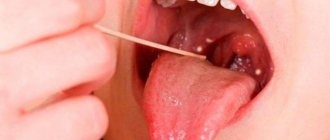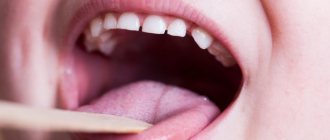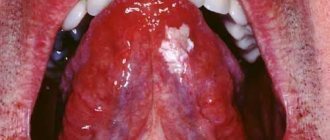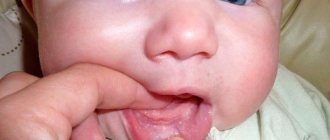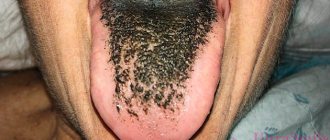The epidemiology (prevalence) of tongue cancer is on average 5 cases per 100 thousand population.
Among the recorded cases of oral tumors, it accounts for up to 60%. Despite the relatively simple diagnosis of this disease, there are advanced cases - people often do not notice the signs or ignore the symptoms of tongue cancer.
Causes of inflammation of the papillae on the tongue
If you have an inflammatory process in your mouth, contact your dentist immediately. Family dentistry in St. Petersburg is a clinic where every patient will be provided with assistance. The doctor will determine the causes of the disease and prescribe treatment. Problems may arise:
- When the patient’s diet includes excessive amounts of sour, sweet, spicy foods;
- If chronic stress develops in the body;
- When the patient received a tongue injury, burn, cuts, punctures;
- If the organ is affected by an allergic reaction;
- For some diseases of internal organs;
The surface of the muscular organ changes significantly under aggressive influence. The provoking factor is xerostomia, disease of the salivary glands, Sjogren's syndrome, diabetes mellitus. With glossitis, the sensitivity of the papillae increases. During the examination, the doctor must exclude HPV, leukoplakia, aphthous stomatitis, syphilis, and oral fibroma. Children are examined for scarlet fever.
Sometimes the disease can be triggered by acid reflux, gastritis, throat infections, systemic inflammation of the gingival tissues when the pathogenic microorganism develops rapidly. Taking some medications can cause pain. High concentrations of alkali or acid have a negative effect on the condition of the muscular organ. Injuries on the tongue can occur from a hard brush, dentures, or tartar.
Prevention methods, prognosis of tongue cancer
You can reduce the likelihood of developing the disease by giving up bad habits: smoking, drinking alcohol and chewing tobacco. If there is dental pathology that contributes to chronic injury to the mucous membrane, the oral cavity is sanitized: dentures are reinstalled, fillings are treated, and the bite is corrected.
Maintaining basic oral hygiene can significantly reduce the risk of developing cancer. In terms of prognosis, regular preventive examination by a dentist is important, during which the first signs of cancer can be noticed, which allows a person to be referred to an oncologist in a timely manner.
With radical combined treatment of tongue cancer in the early stages, the five-year survival rate approaches 90%; in advanced cases it drops to 60%. If treatment is started at the metastatic stage, the five-year survival rate is less than 35%, even in Moscow.
Symptoms
When the papillae on the tongue become inflamed, tissue sensitivity increases significantly and taste changes. Patients complain of unpleasant discomfort in the mouth. The taste spectrum is distorted and becomes unnatural. In addition, a number of other symptoms appear.
- Noticeable tissue swelling.
- Marked increase in size of the papillae.
- Tingling and itching.
- Burning, mild soreness.
If you do not consult a dentist in time, complications may develop: lingual eruptive papillitis. This disease occurs over a long period of time with an increase in body temperature. Most often the disease affects children. An alarming symptom is the appearance on the surface of the vocal organ of bubbles (pustules) filled with a transparent liquid. When the first signs of illness appear, you should immediately visit the dentist. Timely treatment of the disease minimizes complications and speeds up recovery.
Folded tongue
A folded tongue is a congenital structural anomaly characterized by the appearance of deep folds resembling wrinkles on the back of the tongue. The mucous membrane is not damaged, and the person does not experience any discomfort. The folds are located in the longitudinal and transverse directions and can appear both in childhood and in adulthood. Sometimes a folded tongue is a symptom of Melkersson-Rosenthal disease, but in general it is a variant of a normally developed organ.
Folded tongue
The reasons for the appearance of a folded tongue are not clear. No treatment is required, but it is necessary to regularly remove food debris from the folds. If you do not take care of your tongue, it may become inflamed and cause bad breath.
Localization
If the papilla on your tongue is inflamed, visit the dentist. Only he will be able to correctly determine the causes of the disease, find out what caused the damage to the mucous membrane of the mouth and the body of the tongue. The area where the disease is localized plays an important role in making the correct diagnosis. Pathology can cover the entire organ, part of it, or the sides. Based on this factor and the clinical picture, we can assume what exactly caused the inflammation.
In all languages
When the mucous layer of an organ is affected over its entire surface, the most common cause is a thermal or chemical burn. One can assume the infectious nature of the pathology. If the damage is severe, there may be no taste at all. Patients complain of severe burning.
On the root
Most often, the papillae on the tongue at the base become inflamed due to the action of allergens. The affected root of the muscular organ causes difficulties such as the perception of bitterness, because the inflammatory process has affected the circumvallate papillae. They are the ones responsible for this function. The patient's salivation increases, and the tissues in the oral cavity swell. This condition can also be caused by problems with the digestive system, too high or low acidity of gastric juice. It is on the back of the speech organ that bacterial or fungal glossitis is localized.
On the tip
The disease can affect the tip. This often occurs due to mechanical injuries or damage. The edge of the tongue is the first to come into contact with excessively hot food or aggressive drinks, which burns this area. Soft tissues often rub against sharp chips of crowns and are subject to accidental biting.
Side
The delicate surface on the sides often suffers from various anomalies. Leaf-shaped, conical, filamentous, mushroom-shaped structures are exposed by the teeth. This leads to an increase in the papillae, their hyperemia due to mechanical damage from fangs and molars. Also provoking factors are painful microorganisms and burns of chemical origin.
Black tongue
Definition and symptoms
Black (hairy) tongue is a condition in which the surface of the tongue becomes keratinized and there is hyperplasia of the filiform papillae. The epithelium sloughs off, and bacteria begin to multiply on the lesions, producing a dark pigment, as a result of which the tongue becomes brown or black. The colored papillae resemble short hair in appearance, hence the name. The lesion spreads along the center line of the tongue, acquiring an oval or triangular shape.
Black tongue
The papillae reach a length of up to 2 cm and a diameter of up to 2-3 mm. Black tongue is not an independent pathology, but a symptom of various diseases or a consequence of the influence of a number of provoking factors. Occurs most often in men over 40 years of age. The disease occurs in two stages - in the first, the papillae grow and thicken without changing color. Timely treatment can prevent darkening and eliminate symptoms. During the second stage, the papillae begin to become keratinized and blacken.
Reasons for development
Factors causing lesions are divided into three groups:
- physical and chemical: antibiotic therapy, alcoholic beverages, cigarette smoke, insufficient oral hygiene, burn of the mucous membrane of the tongue;
- infectious: candidiasis, systemic fungal infections;
- pathological conditions of the body: fever, dehydration, decreased saliva production, metabolic disorders, diseases of the stomach and intestines, impaired trophism of the papillae of the tongue.
Treatment
Therapy consists of eliminating provoking factors, treating concomitant pathologies and following a diet. When diagnosing, diseases of the stomach and intestines, diabetes and fungal infection should be excluded. If candidiasis is detected, in addition to the main treatment, rinsing the mouth with salicylic acid and resorcinol is prescribed.
It is undesirable to eat salty, sour and bitter foods, which aggravate the course of the disease. If the papillae are severely overgrown, the cryodestruction method is used. The overgrown tissues are exposed to cold, after which they are removed.
Article on the topic: Candidiasis balanoposthitis in men
Prevention and prognosis
Prevention consists of timely treatment of the main pathologies, daily cleaning of the tongue with a special brush, and giving up alcohol and smoking. With adequate therapy and elimination of provoking factors, the prognosis is favorable, the tongue returns to normal within a few weeks.
Diagnostics
Basic diagnostic methods in dentistry allow a thorough examination to be made in order to make the correct diagnosis. During the initial examination, the dentist determines the size of the pathological zones, appearance, color, and shape of the organ. The doctor finds out whether there is swelling of the tongue, ascertains plaque and its localization, abrasions, punctures, eczema, ulcers. The health of gum tissue and teeth is important.
In order to determine the type of pathogen and the form of the disease, a number of tests are prescribed:
- Histological smear;
- Sensitivity is determined using a special test;
- A general blood test is informative;
Systemic pathologists are also excluded: HIV, syphilis, hepatitis, AIDS. If necessary, the patient is referred for consultation to a gastroenterologist, dermatologist, endocrinologist, otolaryngologist, or immunologist.
Features and structure
To understand how diseases are diagnosed by language, you first need to understand the physiological structure. A healthy human tongue has a soft pink tint, a smooth surface and a moist environment. It is made up of muscles, which makes it very mobile. The back area of the tongue that connects to the lining of the mouth is called the root.
The shade, shape and presence of lesions play an important role in identifying various diseases. The front (the most mobile part) is called the “body” of the tongue. The top area is called the "back". All zones in the tongue are covered with small papillae, the main function of which is to distinguish the taste of the food a person eats. For the same reason, such papillae make it a little velvety to the touch. Since ancient times, the tongue has been considered an organ of health. It was by this method that in most cases the patient was diagnosed, without using modern diagnostic techniques such as blood tests or ultrasound.
Treatment
The diagnostic result allows you to prescribe treatment. Therapeutic dentistry has new methods and technologies that will return the patient to health.
- The patient is advised to adjust his diet and reduce spicy and sour foods in his diet. Dishes should not be hot.
- Fillings and dentures that injure the mucous membranes need to be replaced.
- You should have your oral cavity professionally sanitized.
- Remove soft and hard deposits on crowns.
- Cure caries, gum inflammation.
The therapeutic course may include taking antibiotics, anti-inflammatory drugs, and a course of treatment for diseases of internal organs. Regular visits to the dentist are a way to prevent oral problems and complications of existing diseases.
An injured, inflamed muscle organ requires tissue regeneration. For this purpose, drugs containing carotene are prescribed: Aekol, Retinol, Chlorophyllipt, Lugol. Ointment applications are made from Solcoseryl and Cholisal. For pain, anesthetics are used: Trimecaine solution, Anastezin emulsion. Patients are recommended medications to stimulate the body's defenses and vitamins.
If the disease is infectious, a scraping is first done. A pathogenic microorganism is identified in the laboratory. Then therapy is carried out according to the obtained strains. Candidiasis is eliminated with fluconazole. Acyclovir is prescribed against herpes. Metrogil-denta treats protozoal infections.
Plaque and its types
A coating that forms on the tongue usually indicates toxins in the intestines or stomach. It can be of the following varieties:
- White plaque may indicate lung disease and poor bowel function. If the plaque has a dirty white-gray color, then this indicates prolonged constipation and the accumulation of toxins in the body.
- A small plaque in the middle of the organ indicates gastritis, its exacerbation or the transition of the disease to a chronic form.
- If you develop a thin, easily removable plaque that has a metallic taste, you should contact a gastroenterologist, as this is a clear sign of acute gastroenteritis.
- When a dry gray plaque appears, which is localized throughout the organ, you need to undergo a full examination of the gastrointestinal tract, as this may indicate the development of an abscess in the abdominal cavity.
- Black plaque occurs with serious disturbances in the gastrointestinal tract, in particular the gallbladder.
- A dense yellow coating occurs with liver disease (hepatitis).
Inflammation of the papillae on a child's tongue
If the child’s body is weakened and he complains of discomfort in the mouth and pain in the muscle organ, parents should immediately show him to the pediatrician and pediatric dentist. The doctor will determine whether his papillae are red and whether there is an inflammatory process in the mouth. Once the diagnosis is made, therapy is prescribed. As a preventive measure, parents should ensure that the baby regularly brushes his teeth and rinses his mouth thoroughly. Children's immunity is not strong enough, so the body cannot cope with the disease on its own. The situation is complicated by the fact that children are curious; they put most objects in their mouths. To avoid serious complications, take your child to the dentist regularly.
By the way
It's sweeter to be a girl! Our perception of the taste of food depends not only on the state of the tongue, but also on many other factors, including the gender and age of the person. This is exactly the conclusion that Danish scientists came to. Experts conducted a large study involving almost 9,000 schoolchildren. All children received a set of samples of different foods, with the help of which experts had to find out how well boys and girls distinguished tastes of different intensities. It turned out that girls are better at distinguishing one or another taste than boys. Thus, the sensitivity threshold of boys to sour is 10%, and to sweet – 20% lower than that of girls. An important factor in the perception of taste is also the age of a person. Children's taste buds work better than adults'.
Interesting
Pigs are more sensitive than people. The person is a fairly average taster. He only has 3 thousand taste analyzers. The whale, which swallows a lot of fish without even chewing, has only a few or none at all. The pig, oddly enough, is more taste-sensitive than humans: it has 5,500 taste analyzers. A cow has 35,000 of them, and an antelope has more than 50,000! So not only do animals have a sense of taste, but many of them are much better tasters than humans. Marine animals are often covered in taste buds on the outside. Fish, for example, sense taste over the entire surface of their body. But creatures such as flies and butterflies can taste with their paws. Snakes and lizards use language for this purpose, but not quite in the same way as we do. They seem to shoot out the tip of their tongue, which catches small particles of food. These particles are delivered using the tongue to a special organ in the upper part of the mouth, which tastes and smells food.
Glossitis in children
In childhood, the disease develops between 1 and 5 years, and the causes have not yet been precisely studied. Most often, these are hereditary factors, poor nutrition, or infectious tissue lesions.
Externally, the disease manifests itself in the form of rashes and spots on the tongue, which is accompanied by itching and swelling. This leads to the child starting to scratch the surface. Microcracks form on the tissues, signs of infection. Glossitis does not pose a serious danger; often its symptoms in a child go away if the diet is adjusted, peace and a favorable environment in the family are ensured. You need to start giving multivitamins, include fruits and vegetables in the menu, but only those that do not have an irritating effect.
Manifestations during pregnancy
Glossitis during pregnancy usually develops against the background of weakened immunity, lack of minerals and vitamins. Pregnant women are usually diagnosed with Gunter's or desquamative forms, the symptoms of which are:
- change in color of the surface of the tongue, the appearance of white spots that alternate with rich red ones;
- salivation increases, becomes more than usual;
- a varnished tongue effect appears, which indicates B12 deficiency anemia;
- loss of appetite;
- sharp pain in the area of the affected tissue when talking or chewing.
Therapy during pregnancy is carried out with mandatory supervision by a gynecologist. In most cases, it requires adjusting the diet, using rinses and sprays, and eliminating irritating factors. But it is impossible to delay treatment, since an infectious lesion can negatively affect the health of the fetus.
Diagnosis and treatment
In order to begin therapy, the doctor first conducts an initial examination and prescribes the following diagnostic measures:
- visual examination, which in 95% of cases allows you to immediately make a diagnosis;
- undergoing RPR testing to detect antibodies to cardiolipin antigen;
- scraping from the surface to exclude diseases such as syphilis, which are similar to glossitis;
- conducting a PCR study to identify infectious agents.
Treatment is prescribed after receiving and analyzing research data. The following measures are usually prescribed:
- enhanced oral hygiene, use of special rinses;
- carrying out strengthening therapy, restoration of immunity;
- treatment with antiseptics;
- adherence to a strict diet;
- taking targeted medications, for example, drugs with an antifungal effect.
When the first symptoms appear, you should consult a doctor. The use of traditional medicine is not recommended, as they can cause serious deterioration and complications. Only complex therapy under the supervision of a specialist will help cope with the problem and eliminate further problems.
Diagnosis and treatment methods for glossitis
In most cases, the basis for diagnosis is the patient’s complaints and visual examination of the oral cavity.
When visiting a doctor, be sure to indicate when the pathological manifestations appeared and what they are associated with. If any dental treatment was performed, be sure to mention it. It is better to seek medical help at the first signs of illness. Avoid taking any medications, especially antibiotics. This may make diagnosis difficult and reduce the effectiveness of subsequent therapy.
To determine the cause of glossitis, additional diagnostic methods are used: examination of scrapings from the mucous membrane under a microscope, ELISA, PCR. These methods make it possible to determine what pathogen caused the disease, as well as to confirm or exclude syphilitic glossitis.
Determining the causative agent of the disease is the basis for successful treatment. The emphasis is on etiotropic therapy, that is, eliminating the cause of the disease. If glossitis is bacterial in nature, properly selected antibiotics will give an excellent result, but these drugs are completely useless for viral or candidal glossitis. For fungal infections, antimycotic drugs are prescribed; for viral infections, antiviral and immunomodulators are prescribed. If the cause of glossitis is anemia, treatment of the underlying disease is necessary. Special tactics are necessary for the pathological process caused by Treponema pallidum. A dermatovenerologist must be involved in the treatment of syphilitic glossitis.
An integral part of glossitis treatment is diet. In the acute period, eating food causes serious difficulties for patients, so porridges, purees, and pureed soups are recommended. Food should not be cold or hot. Solid foods, spicy, salty, sour are excluded. This avoids irritation of the mucous membrane, which minimizes discomfort and speeds up the healing process.
In some patients, the pain syndrome is significant. In such a situation, unpleasant sensations can be relieved with the help of applications with anesthetics. To moisturize excessively dry mucous membranes, products containing glycerin are used.
Local therapy includes removing plaque from the tongue and treating with antiseptic solutions. Substances such as chlorhexidine, furacilin, and potassium permanganate are widely used. To speed up the recovery of the mucous membrane, vitamin A is used topically.
Systemic antibiotics and antiviral drugs are prescribed according to indications. This tactic is used in severe cases. With a mild clinical course of glossitis, a positive result can be achieved with local treatment.
In severe cases, swelling of the tongue can be significant and make breathing difficult. In such situations, it is necessary to take glucocorticosteroids. More often they are used in the form of ointments.
During treatment you need to give up smoking and alcohol. These substances irritate the mucous membrane and prevent its regeneration.
Some patients with glossitis have keratinized areas on the tongue. Such changes cannot be treated conservatively and can only be removed surgically.
If you consult a dentist in a timely manner and follow all his recommendations, the outcome of the disease will be favorable. Glossitis responds well to treatment if its cause is determined and targeted. If the disease is not treated, it can be complicated by an abscess or phlegmon. These conditions require surgical treatment and long-term antibiotic therapy, so it is better to start treatment at the initial stage.

